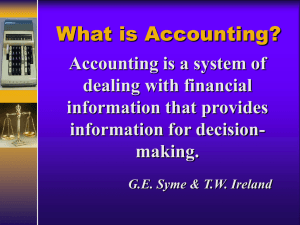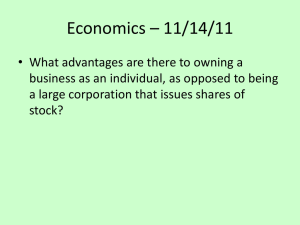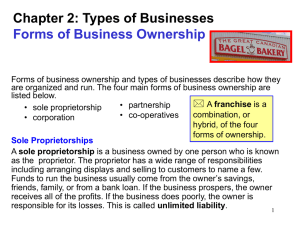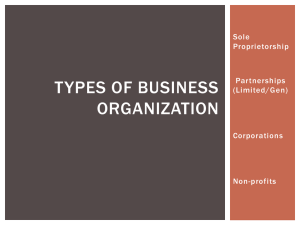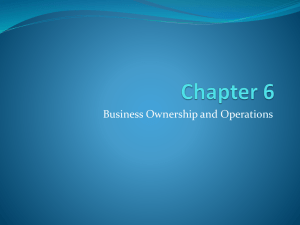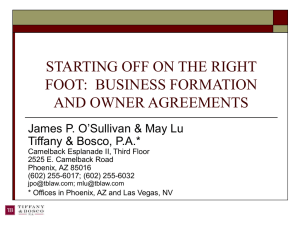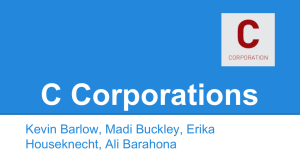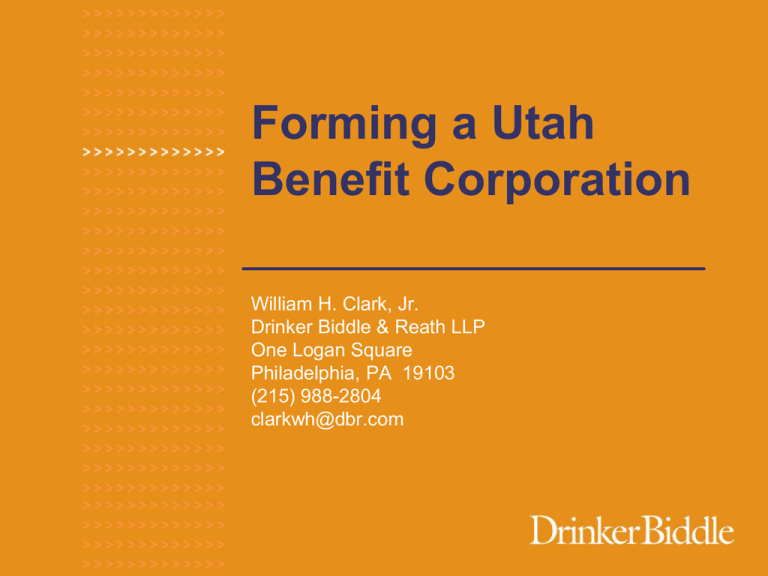
Forming a Utah
Benefit Corporation
William H. Clark, Jr.
Drinker Biddle & Reath LLP
One Logan Square
Philadelphia, PA 19103
(215) 988-2804
clarkwh@dbr.com
basic features of a benefit
corporation
a benefit corporation is a type of business
corporation with the following distinctive features:
purpose to create a material positive impact on
society and the environment in addition to its
purpose to conduct its chosen business
activities
directors have a duty to consider the effects of
their decisions on all of the corporation’s
constituencies
must report each year on its creation of
general public benefit
2
benefit corporations
in context
although there is some academic
debate on the point, there is a strong
bias in U.S. corporation law in favor of a
norm of shareholder wealth
maximization
to understand the current state of the
law, it is helpful to know how the
concept of a corporation has evolved
3
the corporation is a medieval construct
that has weathered the test of time
the oldest existing stock
corporation is Stora Enso, a
Swedish mining company
• oldest share dates to 1288
• royal charter
• was a method of allocating
shares/right to use mining
equipment
Beretta was established in
1526 and has been owned by
the same family continuously
since then
4
corporations were the agents of empire in the
Age of Exploration:
• agent of monarchy - monarchs bestowed royal
charters/monopoly
• extended European Empires in the 1400s to 1700s
• allowed financing beyond the limits of royal treasuries
• monarchs were external conscience and source of
capital to avoid creating political and economic rival
• e.g., Hudson’s Bay Company controlled 15% of North
American landmass
5
the power to charter
corporations was
transferred from monarchs
to government bodies in
the Age of Enlightenment:
• divine right of kings
debunked
• European monarchies
diffused authority to charter
corporations to legislative
and administrative bodies
• legislature became the de
facto external conscience
with power to revoke charter
6
America inherited English
common law and the
concept of a corporation in
1776:
Framers of Constitution feared
the power of corporations
creating a corporation required
an act of the legislature
thus legislature as
external conscience
many checks and balances to
power of corporations:
personal liability for debts
and actions
often limited to terms of
10-20 years
very few in America before
1800
7
first widespread use of corporations in America
came during the Age of Westward Expansion when
they were used to organize public utilities such as:
– bridge
– canal
– ice
– mining
– railroad
– sewer
– street railway
– telegraph
– turnpike
> thus formation of corporations still had a strong
public purpose
8
the corporation became the agent of the Age of Industry in
the later 1800s as the checks and balances of an external
legislative conscience were removed:
•
•
•
free incorporation
limitations on state power to revoke charter
adoption of concept of limited liability for officers, directors and
shareholders
• courts impose common law of fiduciary duties upon directors to
prevent abuse by directors of shareholders
9
Where has that history
brought us?
10
There should be no confusion (of which there is evidence) of the
duties which Mr. Ford conceives that he and the stockholders
owe to the general public and the duties which in law he and his
codirectors owe to protesting, minority stockholders. A
business corporation is organized and carried on primarily for
the profit of the stockholders. The powers of the directors are to
be employed for that end. The discretion of directors is to be
exercised in the choice of means to attain that end, and does
not extend to a change in the end itself, to the reduction of
profits, or to the nondistribution of profits among stockholders in
order to devote them to other purposes.
- Dodge v. Ford (MI. Sup. Ct., 1919)
11
“Milton Friedman famously declared that the sole
business of the managers of a publicly held
corporation was to maximize the value of its
outstanding shares. Any effort to use corporate
resources for purely altruistic purposes he equated
to socialism”
- from “Milton Friedman Was Right”
by Henry G. Manne
12
“Directors cannot defend a business
strategy that openly eschews stockholder
wealth maximization.”
- ebay v. Newmark (Del. Ch., Sept. 2010)
13
Is shareholder primacy
the end of the road?
14
Age of Exploration
Age of Enlightenment
Age of Westward Expansion
Age of Industry
?? Age of Sustainability ??
15
comparison to
certified b corporation
16
certified b corporation
status is a private rating
of the social and
environmental
performance of a
business
a benefit corporation
need not be a certified b
corporation
a certified b corporation
need not be a benefit
corporation
17
18
constituency statutes
18
19
in 1983, the Pennsylvania General Assembly
enacted an antitakeover statute to protect Scott
Paper Company from a Canadian company,
Brascan
among other provisions, the statute said that:
“In discharging the duties of their … positions, …
directors may, in considering the best interests of
the corporation, consider the effects of any action
upon employees, upon suppliers and customers of
the corporation and upon communities in which
offices or other establishments of the corporation
are located, and all other pertinent factors.”
19
20
since the adoption of the Pennsylvania
constituencies statute, 30 some states – but not
Utah – have adopted similar statutes
some states, such as Maryland and Missouri,
limit the application of their constituency statutes
just to situations involving a change of control:
for example, a Maryland corporation may include in its
charter:
“A provision that allows the board of directors, in
considering a potential acquisition of control of the
corporation, to consider the effect of the potential
acquisition of control on:
”(i) Stockholders, employees, suppliers, customers, and
creditors of the corporation; and
”(ii) Communities in which offices or other
establishments of the corporation are located.”
20
21
in 1990, Pennsylvania amended its
constituency statute to add shareholders
to the list of constituencies that may be
considered
the flip-side of demoting the shareholders
may be that the other constituencies now
have a higher status – but note that
consideration of the interests of any
constituency remains at the discretion of
the board
21
22
benefit corporations
in more detail
22
23
relationship to corporation law
benefit corporations are a form of business
corporation
the Utah Revised Business Corporation Act
applies to a benefit corporation except to the
extent there is a special rule for benefit
corporations [§ 16-10b-102(3)(a)]
the provisions applicable to benefit
corporations do not affect the rules applicable
to business corporations that are not benefit
corporations [§ 16-10b-102(2)]
23
24
purpose [§ 16-10b-201]
“A benefit corporation shall have a purpose
of creating general public benefit.”
“The articles of incorporation of a benefit
corporation may identify one or more specific
public benefits that it is the purpose of the
benefit corporation to create …”
“General public benefit” is “A material
positive impact on society and the
environment: (a) taken as a whole; (b)
assessed against a third-party standard; and
(c) from the business of a benefit
corporation.” [§ 16-10b-103(9)]
24
25
benefit corporations should not be
thought of as a form of “hybrid” entity that
combines a business purpose with a
nonprofit or charitable purpose or mission
• although a benefit corporation may elect to
pursue a specific public benefit in addition to
its purpose of creating general public benefit
a benefit corporation is a business
corporation that is operated in a
way that is as responsible as
possible to all of its constituencies
25
conduct of directors
[§ 16-10b-301(1) and (2)]
26
directors MUST consider the following interests and
factors, although the weight to be given these interests
and factors is not prescribed:
shareholders
employees and workforce of the corporation, its
26
subsidiaries, and its suppliers
customers as beneficiaries of the general public benefit
or specific public benefit purposes of the corporation
community and societal considerations
local and global environment
short-term and long-term interests of the corporation
ability of the benefit corporation to accomplish its
general and specific public benefit purposes
27
liability shield for directors
[§ 16-10b-301]
(4) Except as provided in the articles of
incorporation or bylaws, a director is not
personally liable for monetary damages for:
(a) an action or inaction in the course of
performing the duties of a director under
Subsections (1) and (2) if the director performed
the duties of office in compliance with Section
16-10b-840 and this section; or
(b) failure of the benefit corporation to
pursue or create general public benefit or
specific public benefit.
(5) A director does not have a duty to a
person that is a beneficiary of the general public
benefit purpose or a specific public benefit
purpose of a benefit corporation arising from the
status of the person as a beneficiary.
27
28
conduct of officers
[§ 16-10b-303(1)]
officers must consider the same interests and
factors as directors if:
(a) the officer has discretion to act with
respect to a matter; and
(b) it reasonably appears to the officer that
the matter may have a material effect on the
creation by the benefit corporation of general
public benefit or a specific public benefit identified
in the articles of incorporation of the benefit
corporation
28
29
liability shield for officers
[§ 16-10b-303]
(3) Except as provided in the articles of
incorporation or bylaws of a benefit corporation, an officer
is not personally liable for monetary damages for:
(a) an action or inaction as an officer in the
course of performing the duties of an officer under
Subsection (1) if the officer performed the duties of the
position in compliance with Section 16-10b-831 or 1610b-840 and this section; or
(b) failure of the benefit corporation to pursue
or create general public benefit or specific public benefit.
(4) An officer does not have a duty to a person
that is a beneficiary of the general public benefit purpose
or a specific public benefit purpose of a benefit
corporation arising from the status of the person as a
beneficiary.
29
30
benefit enforcement proceeding
[§ 16-10b-305]
(1) Except in a benefit enforcement proceeding,
a person may not bring an action or assert a claim
against a benefit corporation or its directors or officers
with respect to:
(a) failure to pursue or create general public
benefit or a specific public benefit set forth in its
articles of incorporation; or
(b) violation of an obligation, duty, or
standard of conduct under this chapter.
(2) A benefit corporation may not be liable for
monetary damages under this chapter for a failure of
the benefit corporation to pursue or create general
public benefit or a specific public benefit.
30
31
annual benefit report
[§ 16-10b-401]
explanation of how corporation pursued general / specific
public benefit, the extent to which they were actually
achieved, and circumstances that hindered achievement
statement expressing the opinions of the board of
directors on:
•
whether the benefit corporation acted in accordance with its
general, and any specific, public benefit purpose
• whether directors / officers considered the required environmental
and social impacts referenced
• description of ways the benefit corporation, directors and/or
officers fell short
statement of benefit director, if any
assessment of the company’s overall environmental and
social performance using a qualifying third-party standard
the annual benefit report does not have to be audited or
certified
31
32
TRANSPARENCY
third-party standard
standard for defining, reporting, and
assessing overall corporate social and
environmental performance, including
company’s impact on its workforce,
customers, community and the
environment
the organization promulgating the standard
must not have a material relationship with
the benefit corporation or any of its
subsidiaries
32
33
TRANSPARENCY
sample of qualifying standards:
B Impact Assessment (www.bcorporation.net)
Global Reporting Initiative (www.globalreporting.org)
Green Seal (www.greenseal.org)
People4Earth Business Framework
(www.people4earth.org)
Food Alliance (www.foodalliance.org)
ISO 26000 (www.iso.org/iso/social_responsibility)
UL Environment - ULE 880
(www.ulenvironment.com)
33
34
benefit director and benefit officer
benefit director [§ 16-10b-302]
required for publicly traded corporations
must be independent
prepares an evaluation of the corporation’s
performance for inclusion in the annual benefit report
benefit officer [§ 16-10b-304]
optional position
responsible for preparing the annual benefit report
other duties may be assigned relating to
accomplishment of benefit purpose
34
35
availability of annual benefit
report [§ 16-10b-402]
filed with Division of Corporations and Commercial
Code (may exclude any financial or proprietary
information)
sent to all shareholders after fiscal year end
posted on benefit corporation’s website (may
exclude information)
if no website, then free copy must be provided to
anyone upon request (may exclude information)
35
the annual report requirement is
intended to reduce the possibility of
“greenwashing”:
public benefit must be measured by
an independent third-party standard
•
intended to provide a more objective
measure of performance
•
hope is some day to have Generally
Accepted Benefit Assessment Measures
annual benefit report must be publicly
available
•
36
public scrutiny should encourage good
faith efforts to create general public
benefit
37
tax treatment of benefit
corporations
benefit corporation is taxed as either a C
corporation or an S corporation
a business organized as an LLC may find
it disadvantageous to switch to being a
benefit corporation
• may consider mirroring the benefit corporation
form in its operating agreement
• option to switch to being a Maryland or Oregon
benefit LLC
37
38
William H. Clark, Jr.
(215) 988-2804
clarkwh@dbr.com
Drinker Biddle & Reath LLP
One Logan Square
18th and Cherry Streets
Philadelphia, PA 19103-6996
(215) 988-2700
(215) 988-2757 fax
www.drinkerbiddle.com
CALIFORNIA | DELAWARE | ILLINOIS | NEW JERSEY
NEW YORK | PENNSYLVANIA | WASHINGTON DC | WISCONSIN
© 2014 Drinker Biddle & Reath LLP | All rights reserved.
A Delaware limited liability partnership
38

